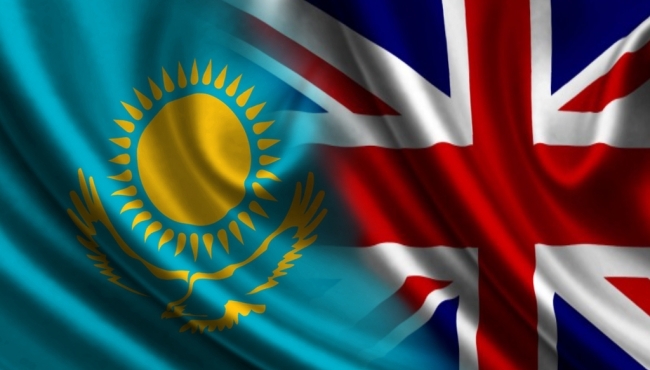LONDON – Recent events in cooperation between Kazakhstan and the United Kingdom have opened new horizons for both countries to maximize the benefits in trade and investment. The test of time and geopolitical developments have proved the stability of this partnership, enabling the countries to further enhance business ties and work together to address emerging economic and environmental challenges.

Photo credit: gov.kz.
The oil, gas, and mining industries were the main beneficiaries of the economic cooperation from the early years of the relationship. Present-day economic ties between Kazakhstan and the UK have morphed into an interest-based collaboration, which prioritizes green energy and technology, agribusiness, mechanical engineering, petrochemical and chemical industries, mining and metallurgy, food production, education, and infrastructure.

Assem Assaniyaz, author at The Astana Times.
As an upper middle-income country in Central Asia, Kazakhstan is the UK’s primary trading partner in the region. The UK is among the 15 largest trading partners for Kazakhstan. Despite fragmentation of supply chains as a result of Russia’s invasion of Ukraine last year, the trade turnover between Kazakhstan and the UK reached $1.847 billion in 2022, which is 58.7 percent higher than in the same period in 2021. Last year’s exports grew by 71.1 percent, amounting to $1.4 billion ($855 million in 2021), while imports reached $384.3 million, a 24.4 percent increase ($308.9 million in 2021).
Kazakhstan supplies crude oil and oil products, silver, copper, aluminum, chrome, ferroalloys, ethyl alcohol, and mineral fertilizers to the UK, while Britain, in turn, exports passenger cars, cruise ships, road and construction equipment, pharmaceuticals, alcoholic beverages, and paper to Kazakhstan.
Foreign direct investment (FDI) remains a driving force for Kazakhstan’s economic growth. In 2022, total FDI inflow in Kazakhstan reached $28 billion, a 17.7 percent increase compared to 2021. Of that amount, British firms invested more than $661 million into Kazakhstan’s economy last year ranking the UK ninth in the list of top 10 largest investors. Overall, the UK has invested more than $16 billion in oil and gas, mining, finance, chemicals, mechanical engineering, metallurgy, and civil aviation sectors in Kazakhstan.
According to the Kazakh Ministry of Foreign Affairs, more than 550 British companies, joint ventures and representative offices with British participation are registered in Kazakhstan. They operate mainly in science, technology, trade, finance, manufacturing, mining, and logistics. Kazakhstan Foreign Investors’ Council Association (KFICA), an advisory and consultative body for investment, includes UK-based Shell, Ernst & Young (EY), and Deloitte as members, and PricewaterhouseCoopers (PwC) as an observer.
Industrial cooperation between the two countries also has a promising future, as Kazakhstan’s strong potential in critical minerals exploration and development aligns with London’s first-ever critical minerals strategy adopted last July, which aims to ensure collaboration with international partners and enhance international markets. Out of the required 18 critical minerals identified by the strategy, Kazakhstan has four in production (bismuth, gallium, rare earth elements, silicon) and 10 explored (vanadium, tungsten, tin, tantalum, niobium, magnesium, lithium, indium, graphite, cobalt).
The UK-based companies that are operating today in the mining and metallurgy sector of Kazakhstan include Arras Minerals, Central Asia Metals, Rio Tinto, and Ferro-Alloy Resources. The latter is working on the continuing development of the Balasauyskandyk vanadium ore deposit in the Kyzylorda Region. The Meritan House, another British company, recently signed an agreement with Zhezkazganredmet, a Kazakh rare metals producer, on the production of rhenium and the attraction of technologies for the extraction of rare earth metallurgy.
The enhancement of economic ties between Kazakhstan and the UK led to the creation of the Kazakh-British Intergovernmental Commission on Trade, Economic, Scientific, Technical and Cultural Cooperation (IGC) in 2013. The IGC plenary sessions cover all domains of political, economic, and social engagement.
During the most recent, ninth meeting in London last February, the Kazakh Ministry of Healthcare signed a memorandum of long-term cooperation with AstraZeneca, the British-Swedish pharmaceutical company. It will contribute to the integration of international practices into the healthcare system of Kazakhstan and localization of the AstraZeneca innovative medicines based on Kazakh production.
The British Chamber of Commerce, which was opened in the Kazakh city of Almaty in 2015, is the UK’s first bilateral business association in Central Asia. It is responsible for the development of business networks, helping to establish new business relationships and maintain existing ones between the two sides.
Another platform that promotes trade and investment opportunities is the British-Kazakh Society (BKS). For more than 20 years, BKS has ensured knowledge-sharing between scientific and business circles, state structures, and non-governmental organizations from Kazakhstan and the UK.
Kazakhstan made a major step in creating better conditions for investors when it adopted the Common Law of England and Wales as the legal modus operandi of the Astana International Financial Centre (AIFC), a regional hub that allows foreign businesses and financial institutions to tap into the Eurasian markets. English common law principles are applied and administered by a panel of British judges at the AIFC Court and the international arbitration center, both independent legal entities, where English is the official language. AIFC offers zero corporate, property and land tax rates, zero income tax rate for foreign employees until 2066, requiring no permits for attraction of foreign labor, and offering a special visa regime. As of now, more than 1,850 foreign companies from 70 countries registered with the AIFC.
President Kassym-Jomart Tokayev has set a target date of 2060 for Kazakhstan to become net carbon neutral. Both Kazakhstan and the UK are aligned in their policies designed to address climate change. Kazakhstan reaffirmed its commitment to reducing greenhouse gas emissions by 15 percent by 2030 at the 26th United Nations Climate Change Conference (COP26) in the Scottish city of Glasgow in 2021. The country, which is also a signatory of the Paris Agreement on climate change, plans to carry out a fivefold expansion in energy production from renewables from 3 to 15 percent by 2030 and double the energy produced by renewables from 20 to 38 percent. For a country whose wealth depends so massively on the extractive energy sector, balancing economic growth and environmental protection is no easy challenge.
The open-door policy to foreign investment remains Kazakhstan’s strategic priority. Committed to reducing the role of the state in the economy, the country established the Kazakh Invest national company in 2017 as a single negotiator on behalf of the government to provide services to investors on the one-stop-shop principle. In support of investment projects, Kazakhstan has launched 13 special economic zones (SEZs). They provide fiscal incentives, including subsidies, exemption from corporate income tax, value-added tax, land tax, and property tax, as well as the non-fiscal incentives like free plots of land and infrastructure, offering investors access to established digital networks.
During the COVID-19 pandemic, Kazakhstan has accelerated digitalization and delivery of government services, including conclusion of investment contracts and investor visa applications. Rapidly evolving digital transformation in Kazakhstan covers nearly all spheres and the production of goods and services. In 2020, Kaspi Bank, the country’s tech leader in payment systems and e-commerce, was named the second largest IPO on the London Stock Exchange (LSE) and brought in more than $1 billion at its listing.
Last March, British Foreign Secretary James Cleverly paid his first visit to the Kazakh capital, where the two sides signed memoranda on the production of green hydrogen and critical minerals. They also considered the logistics sector, including the development of the Trans-Caspian International Transport Route, also known as the Middle Corridor, which will be tested for shipments of Kazakh oil and uranium to Western destinations.
Located at the crossroads of transcontinental transport corridors between Europe and Asia, Kazakhstan is facilitating trade between East and West. The country plays a key role in implementing China’s Belt and Road Initiative (BRI), as more than 3,000 kilometers or 25 percent of the BRI land corridor pass through the territory of Kazakhstan. It is also commonly referred to as the New Silk Road. During the Middle Ages, the British town of Macclesfield in Cheshire was the ultimate western destination for the Great Silk Road routes stretching from a faraway China. Today, in its post-Brexit reality, the UK can set new industry standards while ‘greening’ the BRI corridor with clean energy innovations as a world leader in fighting climate change, and, as a market-oriented country, ensure the project’s relevance in reaching the Atlantic Ocean.
Kazakhstan has recently joined the Effective Governance for Economic Development (EGED) program in Central Asia funded by the British government and implemented by the World Bank and Agency for Technical Cooperation and Development. Initially launched in 2020 to improve the effectiveness, accountability, and transparency of economic policies of Kyrgyzstan, Tajikistan, and Uzbekistan, the EGED program is now being expanded to Kazakhstan to strengthen capability across the region.
It is symbolic the Kazakh tenge banknotes, the national currency, were originally designed by the Banknote Factory of the National Bank of Kazakhstan and the De La Rue Currency company from Britain. The International Bank Note Society (IBNS) nominated Kazakhstan for the best exceptional banknote in 2011, 2012, and 2013. This is the only time when banknotes of one country won three times in a row. Today, tenge banknotes are exhibited at the world-famous British Museum in London.
Over the past three decades, Kazakhstan and the UK have built multi-faceted strategic cooperation, which continues to thrive and is set to become ever stronger. Kazakhstan is diversifying its economy to limit overreliance on the extractive sector and is looking for alternative ways to export Kazakh products. It promotes investment interest in renewable energy sources, mechanical engineering, transportation, logistics, pharmaceutics, chemicals, and tourism.
Following the UK’s exit from the European Union, Kazakhstan, as a gateway to the markets of Central Asia, Western China, and Caspian Sea countries, can become the top choice of a country where the UK can cultivate greater trade and investment abroad, exploring new economic trends and drivers of the region.

